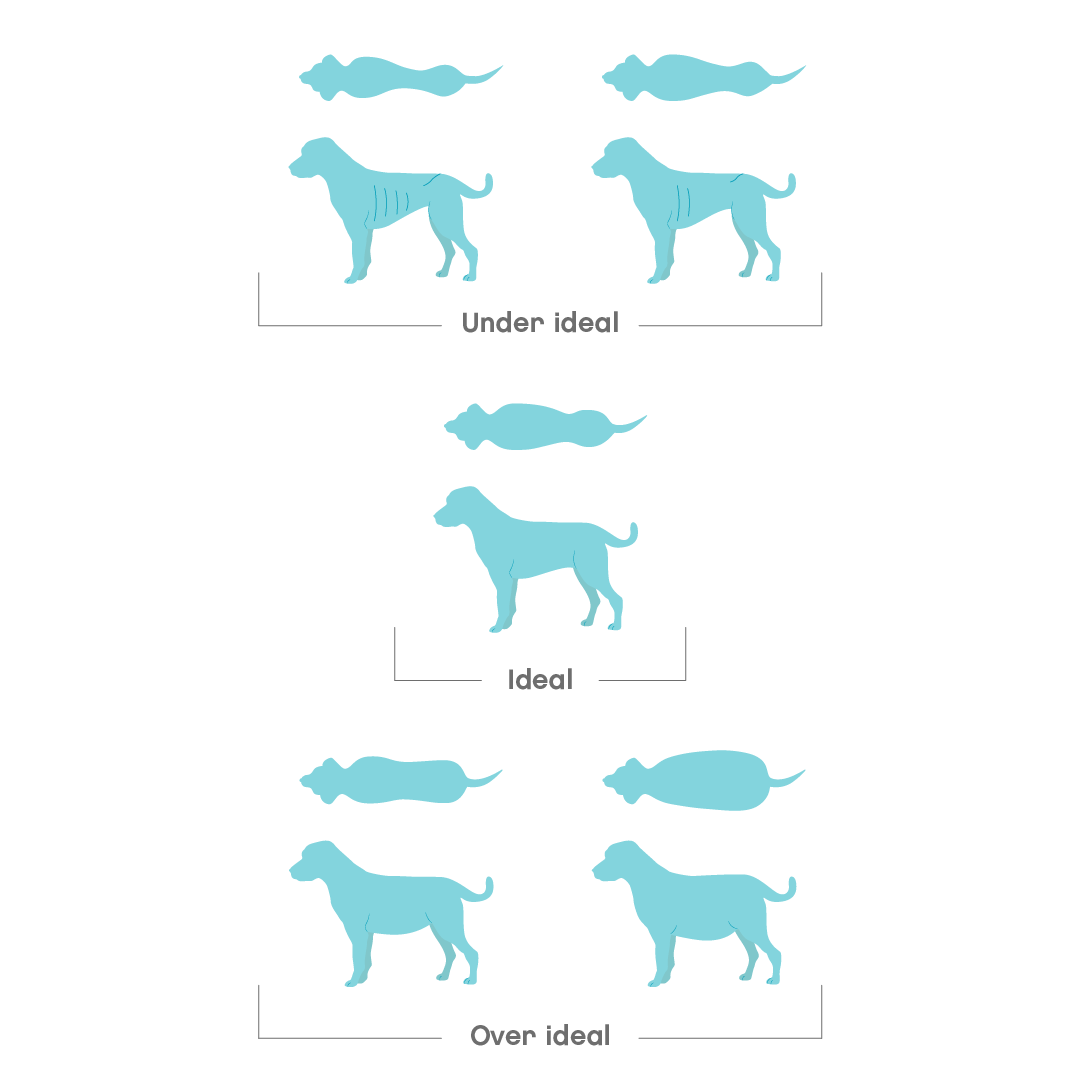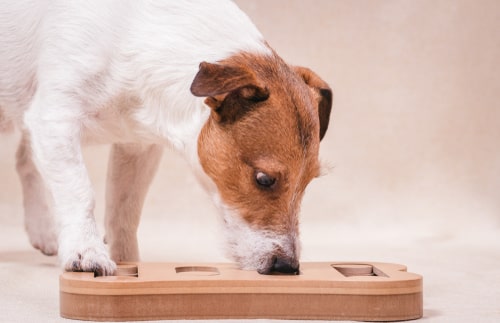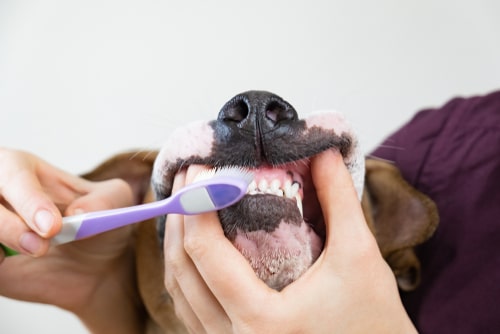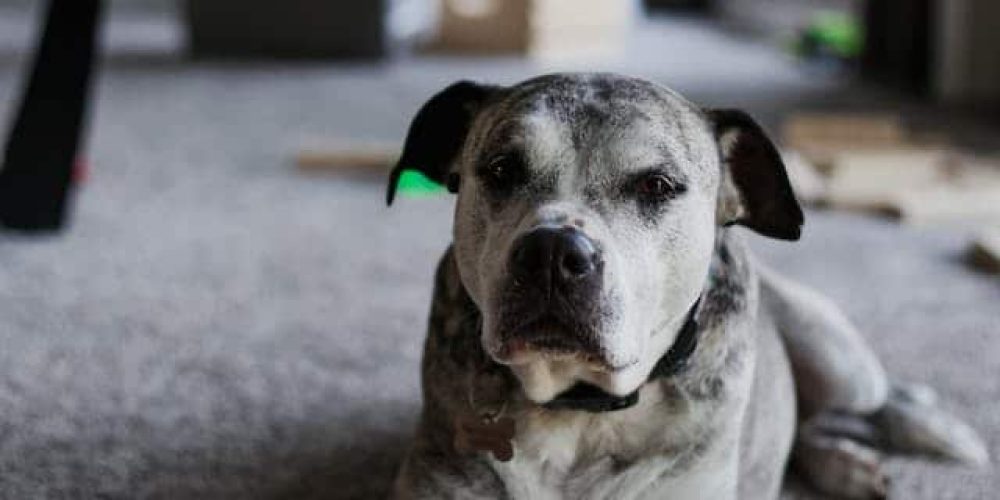Dogs enter their senior years between the ages of 6 and 10 years old, depending on their breed. Smaller breed dogs tend to have a longer lifespan than larger breed dogs, but there are some exceptions to this. Taking all dog breeds into consideration, the average life expectancy in the UK is 11.2 years.
Things to look out for when you have a senior dog
As your dog progresses into their senior years, you may notice both behavioural and physical changes. It’s important to be aware of what may be normal or the signs of something else going on that may need to be checked by your vet.
Behavioural changes
- Slowing down and becoming less playful can be fairly common in senior dogs. However, signs of aggression, pacing at night, or lethargy may be a sign they are painful rather than just ageing changes.
- Just like humans, dogs can develop signs of dementia, including confusion, staring into space, and becoming less playful.
- Speak to a vet if your dog shows signs of senility or pain; there are treatment options available to help reduce these symptoms.
Physical changes
- As dogs age, it is normal for them to lose a little bit of weight, muscle, and body condition over a period of time. Sudden weight loss may indicate there are more severe problems.
- Drinking and urinating more than normal can be a sign of underlying disease in the kidneys, liver, or other organs.
- Vomiting and diarrhoea in senior dogs can indicate underlying disease. Most cases of an upset stomach should clear within 24-48 hours. If the symptoms persist longer or are severe, then it’s best to speak to a vet.
- Stiffness after rest, limping, and reluctance to climb stairs are all signs of pain. Arthritis is extremely common in senior dogs, and there are many treatment options.
- Incontinence is more common in older dogs, both urinary and faecal. Female dogs have a higher risk of urinary incontinence and infections than males. There are several treatment options available to help with the symptoms; speak to a vet to find out more.
Eyesight changes
- Loss of vision in senior dogs is a common problem and can vary from mild loss of sight to total blindness. Cataracts are a common cause of blindness, and surgical repair is an option, though a lot of dogs cope well without this, especially when their eyesight decreases over a long period of time.
Hearing changes
- Long-term ear infections, ageing changes, and other causes can lead to hearing loss in senior dogs. Most dogs tend to cope well with a slow deterioration in their hearing, as they can still feel vibrations around them. Care must be taken around dogs with hearing loss, as they may get easily startled. Avoid sudden movements, and always approach them from where they can see you.
Immune system
- As dogs age, they become more susceptible to disease due to a weaker immune system. Infections, such as kennel cough, can cause more severe symptoms in senior dogs compared to younger dogs.
- Wounds can take longer to heal in senior dogs, especially if they have diabetes or other chronic diseases. Senior dogs are at a higher risk of pressure sores due to being less active.
Our Joii vet team are available 24 hours a day for advice. If you have any questions about your dog, whether physical or behavioural changes, download the app and speak to a vet from the comfort of your home.
How to care for your senior dog
What to feed a senior dog
Dogs’ nutritional needs change as they progress through their life stages, from puppies to adults to seniors. These needs also depend on how active they are, what breed they are, and whether they are neutered or not.
It’s harder for senior dogs to digest fat and protein, so it’s advised to aim for foods with reduced calories and high-quality protein. There are specifically made diets for dogs with medical issues such as arthritis, dental disease, or kidney disease.
It’s important to aim for a healthy weight and body condition score throughout your dog’s life, especially when they are in their senior years. Overweight dogs are more prone to arthritis, diabetes, and heart disease, among others.
Body Condition Scoring (BCS) in dogs
Body Condition Score (BCS) is a scale that gives a practical evaluation of the fat coverage of your dogs body. By checking how easy or not it is to feel certain bony areas of the body, a score is then produced. There are several scales, from 1 to 5 or 1 to 9. The ideal body condition lies in the middle, so either 3/5 or 5/9.
The body areas normally checked for fat coverage are:
1. ribs and spine
2. hips and shoulders
3. waist

Here are a few tips on how to do it.
With your pet in a standing position:
- Place your hands on the rib cage and gently feel for each rib, without pressing too hard
- Feel the waist and look from the top and the side (if you have a very furry breed, it may be harder to assess)
- Feel the spine, which runs down the middle of the back
- Feel the top of the hips and shoulders
Exercise and mental stimulation
Physical exercise is still important for senior dogs. Controlled or shorter walks are advised instead of big, long walks. Mental stimulation helps keep the brain active. Teach your dog new tricks, or get them puzzle toys and feeders.
Make sure to keep an extra eye on your senior dog when outdoors, especially if they are losing their sight or hearing. They may wander off and get lost more easily. It’s advisable to keep them on a lead. You can try an extendable type if your dog likes to explore.

Regular vet check ups
We recommend getting your senior dog a vet check-up at least every 6-12 months. A full physical exam is important to check for body changes, including bad teeth and weight changes, and to identify any lumps or bumps that are not obvious to pet owners.
Senior blood tests are a good way to keep an eye on abnormal changes in the kidneys, liver and other organs in the body. Ideally, once a year, but more often if they are diagnosed with or develop signs of these diseases.
Senior dogs usually need their nails trimmed more often than younger dogs due to less exercise.
Preventative healthcare, which includes vaccinations and parasite control, is still very important for senior dogs. Make sure your dog is microchipped and the details are up-to-date.
Your vet may recommend neutering your dog. This is especially important for females to prevent pyometras and mammary tumours. In male dogs, neutering may help prevent prostate issues.
Home adjustments
Feed your senior dog in a quiet area, somewhere they do not have to compete for their food. Make sure food and water bowls are easily accessible and not somewhere they have to walk far or get upstairs to reach.
Older dogs may need more rest; make sure they have a quiet, comfortable, and safe area to sleep.
Other household changes that can improve safety and comfort for your senior dogs include anti-slip mats, padded beds, covering sharp edges, and using ramps.
Keeping a regular routine can help prevent stress and anxiety in senior dogs. Try to keep mealtimes regular, walk in familiar areas, and avoid leaving them alone for long periods of time.
Dental care
As dental disease is so common in older dogs, try to maintain a good oral hygiene routine from a young age, where possible. Tooth brushing is one of the most effective ways to keep your dog’s teeth clean, followed by dental diets and dental wipes.

Be patient with your dog as they grow older; it can be a sudden, big change, and it will take time for you and for them to adapt. Some dogs may want more space, whereas others may seek attention. It’s important to follow their lead. Read more in our article about the common health problems in senior dogs.
Our Joii vets are available 24 hours a day for advice and to help with any questions you have about caring for your senior dog.











